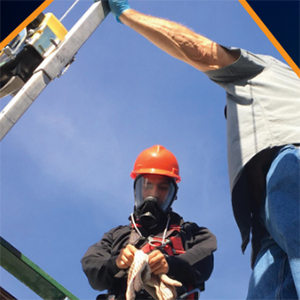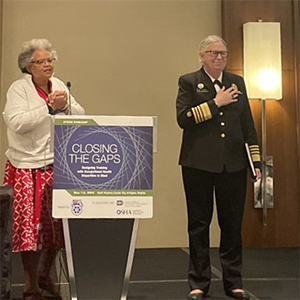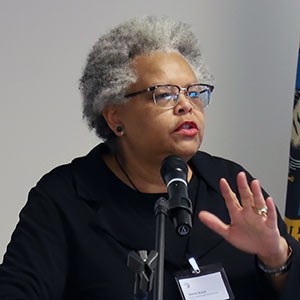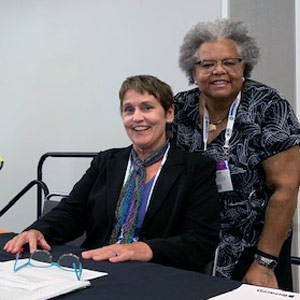New funding through the NIEHS Worker Training Program (WTP) provides critical support to essential workers so they can respond and work safely when faced with exposure to the novel coronavirus. The funding came through the Coronavirus Preparedness and Response Supplemental Appropriations Act, 2020 (see sidebar).
 “We’re confident that each of the WTP grantees will make a big difference in protecting essential workers in numerous local communities,” said Hughes. (Photo courtesy of Steve McCaw)
“We’re confident that each of the WTP grantees will make a big difference in protecting essential workers in numerous local communities,” said Hughes. (Photo courtesy of Steve McCaw)“The Worker Training Program had a swift disaster responder training system in place, which really helped pave the way for a strong COVID-19 response from the grantees,” said WTP Director Joseph “Chip” Hughes. “Moving from our initial focus on essential and returning workers to a longer term sustainable response will be an ongoing challenge as the pandemic threats evolve.”
With the funding, grantees are inventing new approaches for the contexts of social distancing and online work.
Virtual reality and video
Grantees from Alabama Fire College (AFC), in collaboration with the University of Alabama at Birmingham (UAB), use technology to train health care workers and first responders in a safe environment. A simulation module targets hospital workers who are caring for individuals with suspected or confirmed COVID-19.
First, a video shows proper procedures for putting on and removing personal protective equipment (PPE). Next, a micro-simulation provides a virtual environment for health care workers to practice what they learned.
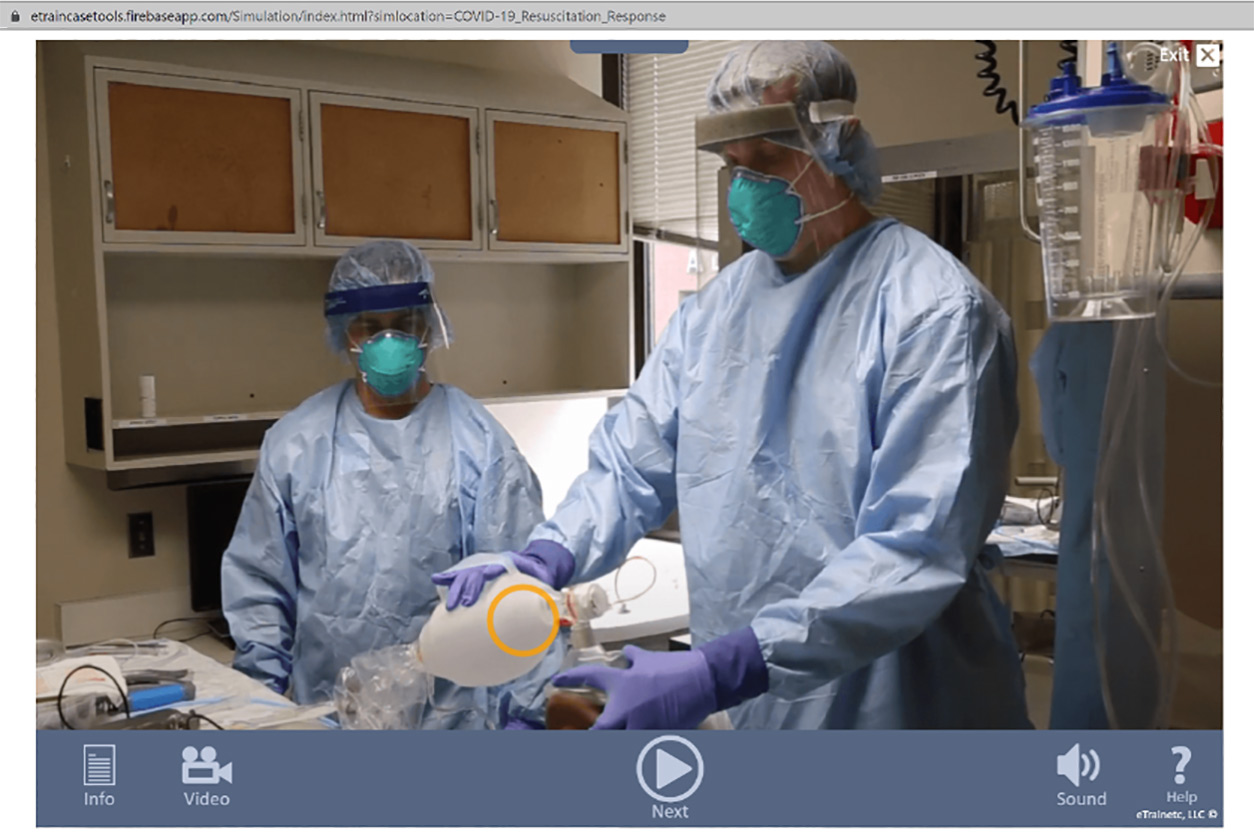 The AFC-UAB simulation module tests knowledge and confidence and provides recommendations for learner improvement. (Photo courtesy of Lisa McCormick)
The AFC-UAB simulation module tests knowledge and confidence and provides recommendations for learner improvement. (Photo courtesy of Lisa McCormick)“These trainings allow frontline workers to review important information on infection control practices, [so they can] perform their jobs while keeping themselves and their families safe,” said Lisa McCormick, Dr.P.H., associate dean for Public Health Practice at UAB.
The AFC-UAB collaborators also offer webinars. In the past six months, they completed four webinars and co-sponsored a fifth with the Alabama Department of Public Health (ADPH). All five may be viewed online.
- Ziad Kazzi, M.D., from Emory University, and Paul Wax, M.D., from the American College of Medical Toxicology, discuss Chemical Hazards During COVID-19: Disinfectants, Cleaning Chemicals & Tear Gas.
- Lekshmi Kumar, M.D., and Alex Isakov, M.D., also from Emory University, explain Operational Challenges Facing EMS during COVID-19.
- ADPH consultant James Sacco takes up Self Care in Challenging Times: Care for the Caregiver in the Age of COVID-19.
- Shea Duerring, M.D., from UAB, reviews COVID-19 in Pediatrics.
- Industrial hygienist Joseph Cocciardi, Ph.D., addresses PPE: What Always Works, What Sometimes Works, What Never Works and Why.
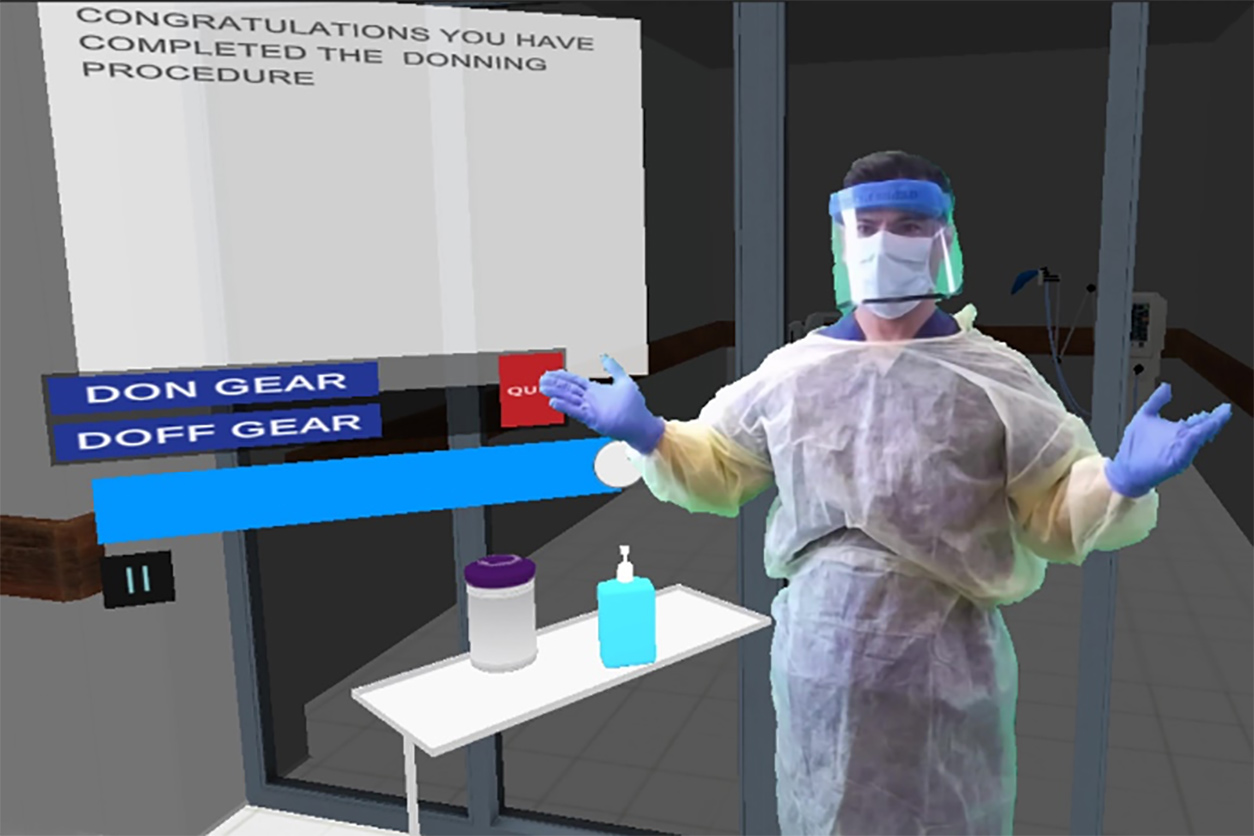 The goal of this tool is to allow AFC-UAB to sustain training efforts, especially in settings where time and resources are limited. (Photo courtesy of Lisa McCormick)
The goal of this tool is to allow AFC-UAB to sustain training efforts, especially in settings where time and resources are limited. (Photo courtesy of Lisa McCormick)Focus on vulnerable populations
Many essential workers are part of immigrant communities. They keep food on the shelves, ensure supply chains operate, and help others. “All workers have the right to a safe and healthy workplace,” said Mitchel Rosen, Ph.D., who leads the Rutgers University Center for Public Health Workforce Development. “The training we provide to the immigrant communities helps them to understand their rights, as well as [the] health and safety protocols they can implement to keep themselves safe.”
The Rutgers team offers train-the-trainer programs for Make the Road New York and Wind of the Spirit. The training includes online and in-person components, with appropriate distancing protocols. “It is important that trainers are part of the community in which they serve,” Rosen said.
Cell phones reach workers in new ways
Online modules are one replacement for in-class experiences during the pandemic. However, many workers, particularly among the most vulnerable populations, lack access to computers. Cell Podium(https://www.niehs.nih.gov/careers/hazmat/training_program_areas/att/sbir_current/#a878302) is a WTP Small Business Innovation Research grantee putting its COVID-19 funding into an approach known as just-in-time training (JITT).
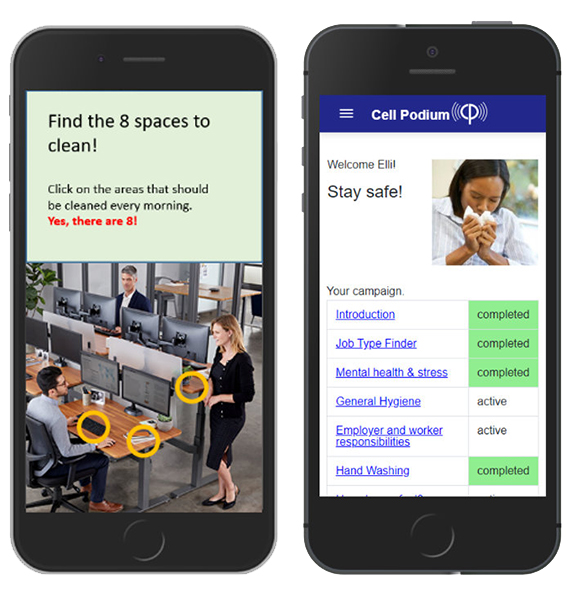 By interacting with the worker, JITT learns about their environment and activities to send only relevant content and to track progress. (Photo courtesy of Cesar Bandera)
By interacting with the worker, JITT learns about their environment and activities to send only relevant content and to track progress. (Photo courtesy of Cesar Bandera)JITT delivers interactive modules that are short and individually tailored to workers’ cell phones. With immediate access, training can take place during the job itself. These modules are pushed to workers via text message, which is more reliable and likely to get worker attention than email.
“The pandemic has forced training programs to diversify the methods in which they teach safety protocols to essential workers,” said Cesar Bandera, Ph.D., who co-founded Cell Podium. JITT was initially launched by WTP more than a decade ago to train skilled support personnel deployed to emergency incidents and has been modified for COVID-19 emergency responders.
(Sheena Scruggs, Ph.D., is a digital outreach coordinator in the Office of Communications and Public Liaison.)






